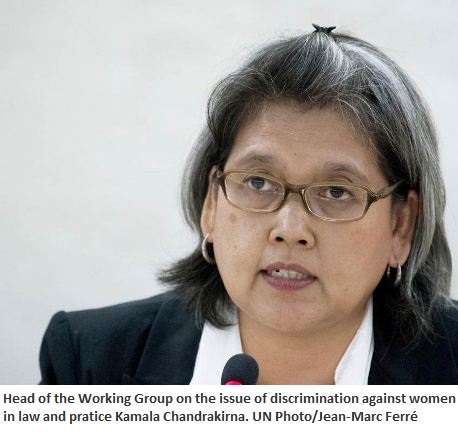Working Group on Women and ESCR attend the seventh session of the UN Working Group on the issue of discrimination against women in law and in practice

The Working Group on Women and ESCR submitted a presentation structured into two parts: the first one addressed the impact of the economic crisis on women’s rights and gave examples of the conditions of poverty, work (including formal employment, informal employment, non-remunerated work, and the situation of domestic workers) and social exclusion in some countries and regions. The second part made recommendations in terms of the way forward. The recommendations were focused on how to integrate a substantive equality approach, on how to reinvent the world, on how to push the boundaries of human rights and on how to implement post 2015 Framework (MDGs and SDGs). Please see below for a summary of the presentation made on behalf of the Working Group.
As a result of our participation in this consultation, the UN Working Group on discrimination against women in law and in practice is willing to continue the exchange with the ESCR-Net WG and has showed interest for involving our Net in future activities. In particular, our WG has been invited to participate in the 8th session of the UN Working Group which will be held in October in Geneva. We would like to encourage groups and individuals from the ESCR-Net who have relevant information to share or are interested in this process to be in contact. For further information or to get involved, please contact Graciela Dede at: WESCR [at] escr-net.org.
Summary of ESCR-Net Working Group Presentation
Women’s social and economic inequality is deeply entrenched in the historic subordination of women and the traditional roles of women in society, which perpetuate such inequality. Economic, social and cultural rights are particularly important for women since they are disproportionately affected by poverty and marginalized in the public and the private spheres. The Montreal Principles on Women’s Economic, Social and Cultural Rights rightly assert: “Women’s poverty is a central manifestation, and a direct result of women’s lesser social, economic and political power. In turn, women’s poverty reinforces their subordination, and constrains their enjoyment of every other right."[1] Members of ESCR-Net’s Working Group on Women and ESCR agree that the current financial and economic crisis has had gender-specific impacts and has placed a disproportionate burden on women, particularly poor, migrant and marginalized women. For instance, statistics reveal that women make up 70% of the 1.2 billion people living in poverty, and among the poor, women are “the poorest of the poor” in most developing countries. Yet this data does not fully reflect the poverty that women may be experiencing within their households: a household may not be considered poor given their income, but women in that household may not have access to any resources. Even if a woman works outside of her home, the power dynamics in the family may mean that she gives all her income to her husband.
In economic crises, there are usually cuts in social spending, such as health and education, which increase the unpaid domestic and care-giving work done by women to make up for the care no longer provided by the state. This reinforces women’s roles as caregivers of children, the sick, and the elderly. Further, women are also particularly affected by the reduction of social programs and subsidies, since they are usually in a situation of socio-economic marginalization and may have benefitted from some forms of public expenditures.
The ESCR-Net Working Group recommends that the UN Working Group:
- Integrate a substantive equality approach to the policies and measures taken: Equality in the enjoyment of ESCR requires not only guaranteeing that women are not discriminated against in the law, but also ensuring that women have the opportunities and conditions to exercise their rights in conditions of equality.[2] Developing and analyzing laws and policies in the area of women’s ESCR requires a deep understanding of the context of systemic discrimination, the gender roles and stereotypes, and the structural obstacles which place women in a disadvantaged social and economic position;
- Reinvent the world: We must see the economic crisis as an opportunity to rethink macroeconomics and to make proposals that respond to the spirit of equality, equity and human rights, recognizing that inequality has been highlighted by some academics as one of the key causes of the crisis itself;
- Push the boundaries of human rights: There is a need to continue highlighting and enforcing the responsibilities of non-state actors and emphasizing State responsibility for actions committed by non-state actors domestically and extra-territorially, including financial institutions; and
- Influence Post 2015 Framework (MDGs and SDGs): We must ensure a strong intersectional gender perspective throughout the post-2015 framework and not just as an isolated goal
[1] The Montreal Principles on Women’s Economic, Social and Cultural Rights. Canada, 2002. Available at: http://www.escr-net.org/actions/actions_show.htm?doc_id=426624.
[2] Facio Alda, Engendrando nuestras perspectivas, Revista Otras Miradas, Volumen 2, Número 2, Diciembre 2002, Grupo de Investigación en Género y Sexualidad, Facultad de Humanidades y Educación, Universidad de Los Andes, Mérida-Venezuela.
